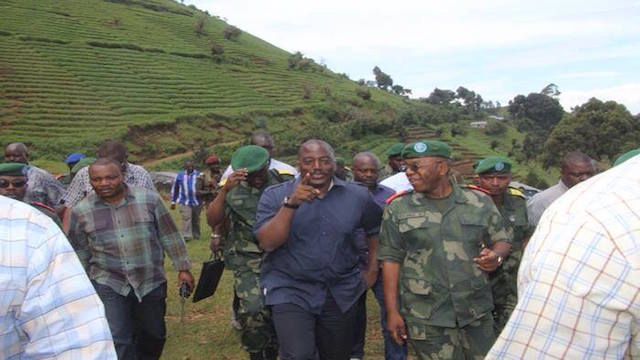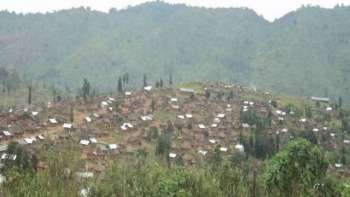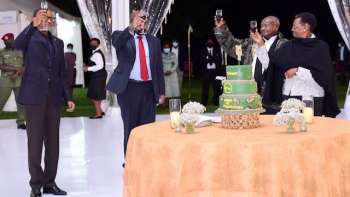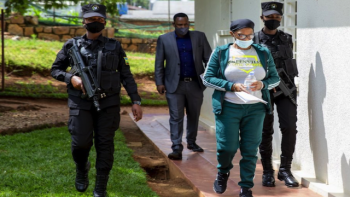"Fifteen years is a whole lifetime. All that we ask is that we be treated as adults," the DRC Government Representative at the United Nations, Gata Mavita wa Lufuta, told the UN Security Council on January 22, 2015 during a briefing on the situation in Eastern Democratic Republic of the Congo (DRC) and the need to launch military operations against Rwandan rebels.
He was reacting to the proposition to extend the mandate of the UN Peacekeeping mission in DRC, known as MONUSCO. The peacekeeping mission has been in the DRC for the last 15 years and has spent tens of billions of dollars. Yet, peace has remained elusive, and the DRC Government and the Congolese people, especially those in the Eastern DRC, where insecurity remains high, have become more and more impatient.
The palpable frustration of the DRC government expressed by Gata Mavita wa Lufuta was concretized this Thursday, January 29, 2015, when the DRC military announced that the Armed Forces of the DRC, FARDC, were determined to go it alone, at least initially.
The announcement in Beni, of FARDC military offensive against the Rwandan rebels of the FDLR by DRC Army Chief of Staff, General Didier Etumba, appear to be a slap in the face of the MONUSCO and especially the MONUSCO head, Martin Kobler and UN Secretary General, Ban Ki-Moon. Until recently, the United Nations and UN Secretary General had supported and authorized joint operations by FARDC with MONUSCO.
UN Secretary General Ban Ki-Moon and MONUSCO Head, Martin Kobler, Shunned by Joseph Kabila
Although, Washington and the European Union have welcomed the announcement of a military offensive against the Rwandan rebels, there is uneasiness on the process itself and from the fact that DRC government has blindsided and undercut MONUSCO. According to sources, both within MONUSCO and DRC Government, MONUSCO leaders were not informed on the DRC government decision, until the announcement by General Didier Etumba. Even the announcement itself was so vague and shrouded in mystery and secrecy that the role of the UN in the process remains unclear, and arouses skepticism and concern. This has prompted MONUSCO, through its number two, Abdallah Wafy to make the bizzarre statement:
"That the Congolese army has decided to take the lead, we can only welcome the decision. our role is support the FARDC mission."
According to the sources in Kinshasa, apart from the overwhelming frustration against MONUSCO and its leaders, DRC President Joseph Kabila appears to have been increasingly irate against Martin Kobler and Ban Ki-Moon. He blamed them for the perceived support provided to the DRC Opposition during the recent protests against attempts to change the Constitution to allow a third term. In recent days, DRC President Joseph Kabila has refused any direct contact, including all phone conversations, with both Ban Ki-Moon and Martin Kobler.
MONUSCO and Humanitarian Organizations Against Military Leaders
Another complication comes from the DRC military officers appointed to lead military operations against Rwandan rebels. During the previous operations in 2009, FARDC and Rwandan Defense Forces commanders committed large scale massacres, rapes and war crimes. The operations also led to hundreds of thousands displaced Congolese civilians.
The US Government is worried about the repeat of 2009, with U.S. Ambassador to the United Nations, Samantha Power, tweeting on Thursday, that: "Operations v. FDLR must ensure protection of civilians, minimize civilian impact and track with U.N. human rights due diligence policy."
Now, the same officers responsible for the crimes, especially General Bruno Mandevu are back in action. General Bruno Mandevu, appointed, to head the FARDC militarys operations, known as Sokola 2, had been placed by MONUSCO on a so-called red list over accusations of hundreds of rights violations, including summary executions and rapes in 2009.
Hence, there is a heightened concern of a repeat of the massive grave human rights violations and war crimes.
If this happens, FARDC leaders, DRC Government, and potentially MONUSCO leaders may find themselves at the center of another human tragedy.
Meanwhile, according to sources in Lubero, Rutshuru, and Walikale, North Kivu, the operations have yet to start.
















